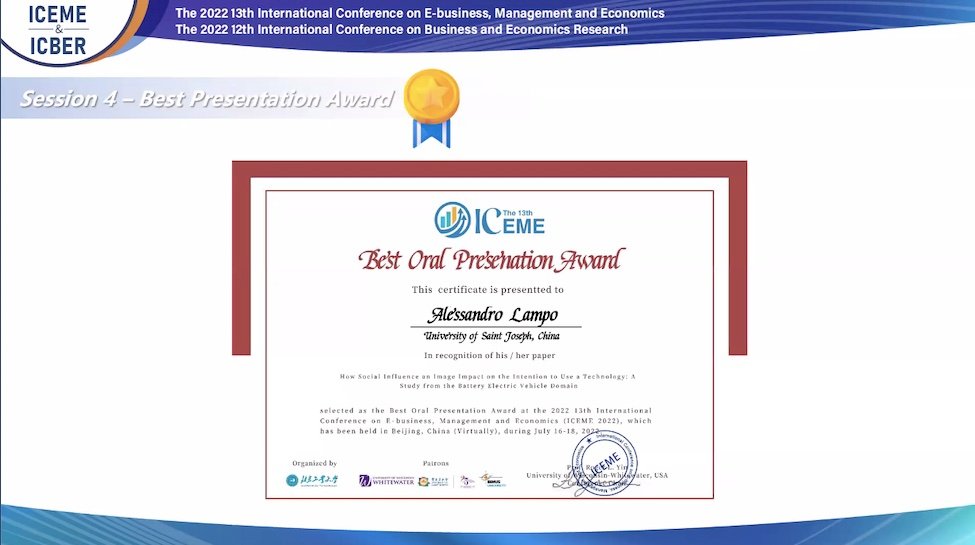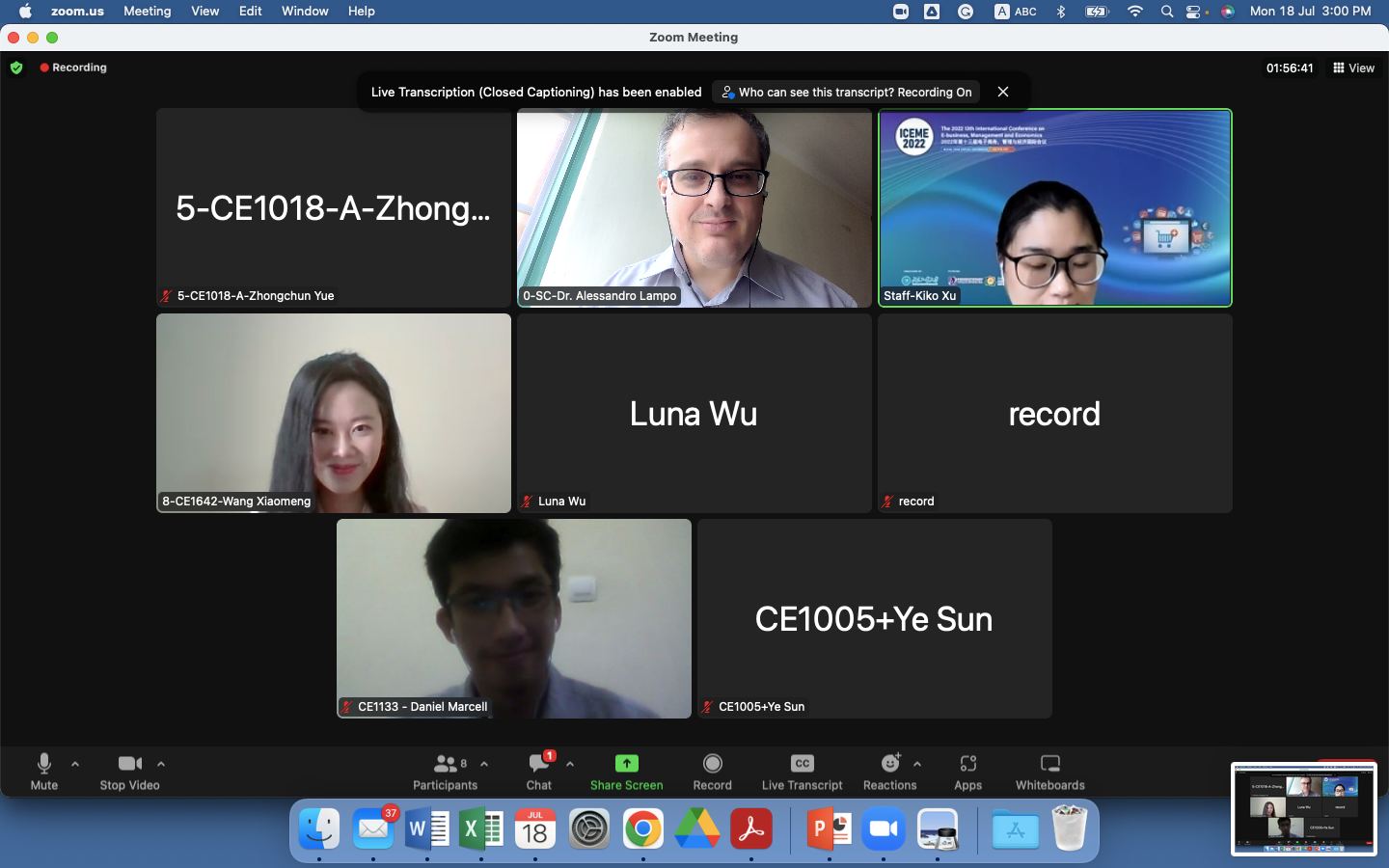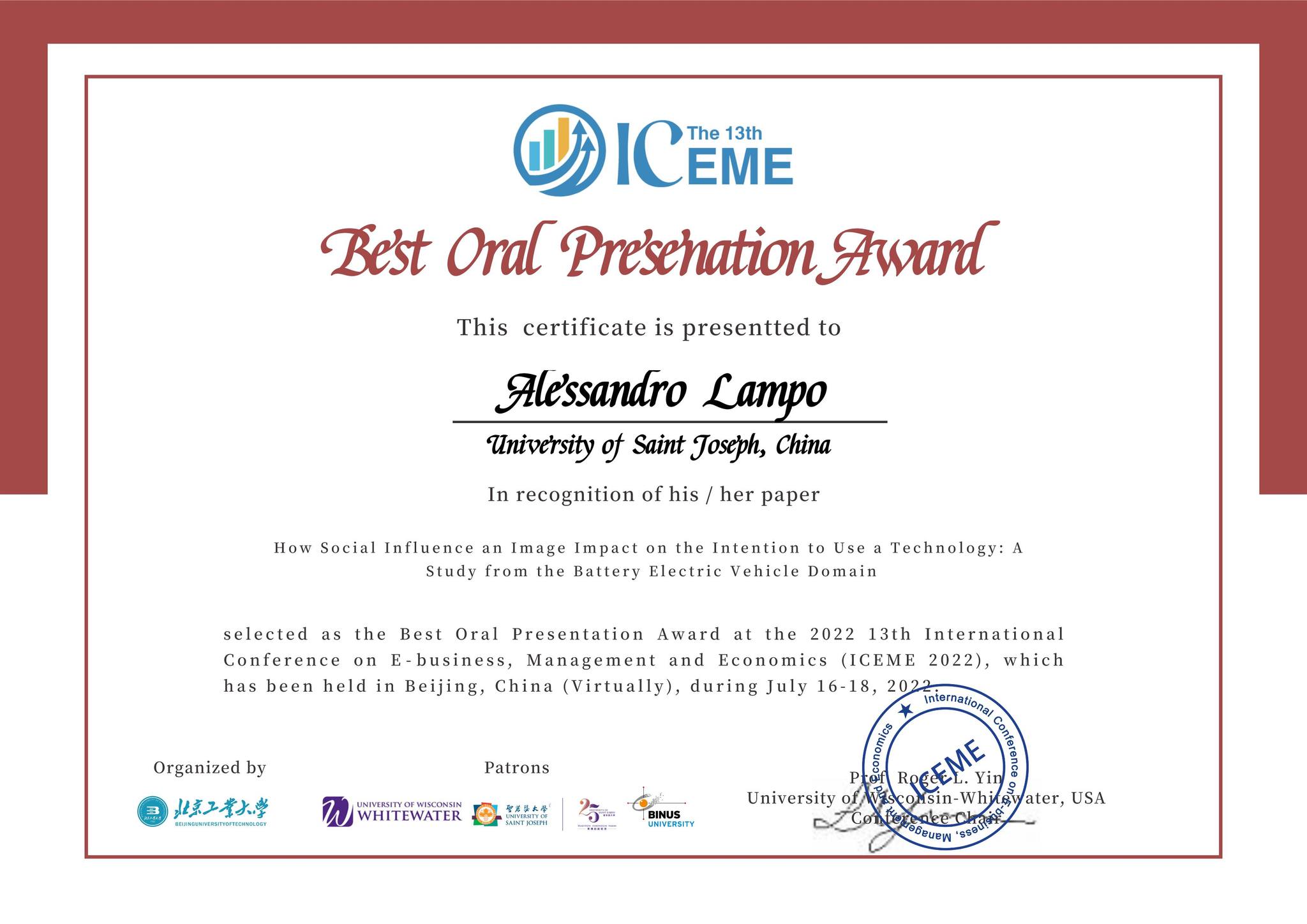Dr. Alessandro Lampo receives “Best Oral Presentation Award” at the ICEME 2022

Dr. Alessandro Lampo receives "Best Oral Presentation Award" at the ICEME 2022
12
Aug
12/08/2022
Prof. Alessandro Lampo from the Faculty of Business and Law received “Best Oral Presentation Award” for his Conference Paper at the “2022 13th International Conference on E-business, Management and Economics”.
Dr. Alessandro Lampo, Assistant Professor at the Faculty of Business and Law of the University of Saint Joseph (USJ) received “Best Oral Presentation Award” for his latest paper titled “How Social Influence and Image Impact on the Intention to Use a Technology: A Study from the Battery Electric Vehicle Domain” (Lampo, A., & Silva, S. 2022) at the 2022 13th International Conference on E-business, Management and Economics (ICEME 2022) held virtually in Beijing between 16th and 18th of July, 2022
The event was organised by the Beijing University of Technology and sponsored by USJ, University of Wisconsin-Whitewater, and Binus University. It aims to address the most significant questions in the areas of entrepreneurship, business administration, quality management, energy economics, international taxation, and more.


About the Winning Paper:
Battery electric vehicles (BEVs) are vehicles that run on electricity and can potentially contribute to reducing pollution, noise, and exploitation of non-renewable resources. Even though sales in Macau are rising, less than 1,6% of the vehicles circulating in 2021 were fully electric. Since BEVs have zero tailpipe emissions, their widespread adoption could reduce air pollutants and positively impact people’s health and the tourist image of the region.
As part of the efforts to promote the uptake of BEV technology, we examined some of the characteristics of local consumers regarding their intention to purchase fully electric vehicles. More precisely, we focused on social influence (i.e., the degree to which an individual perceives how important others such as family, friends, or colleagues believe he or she should adopt a certain behavior) and image motives (the degree to which an innovation is perceived to enhance one’s status in the social system) of a sample of 238 Macau residents.
Our result indicates that we should not expect a large impact of social influence in the case of innovations in their initial phase (as is the case of BEVs). A possible explanation is that social influence may not be significant (yet) because the large majority of people have not fully experienced or used electric vehicles, and therefore they cannot persuade family members and friends to use them. Since a growing number of people are purchasing BEVs, the impact will gain importance over time. In addition, image motives are also important in predicting behavior, as respondents who are more sensitive to image appeal are more likely to use electric vehicles.
We suggest that marketers and policymakers consider social factors when developing communications strategies to encourage the use of new technologies. For example, they could identify opinion leaders to influence consumers towards environmentally friendly vehicles and create pressure to conform over time. Electric mobility could be marketed as a lifestyle that is socially desirable by the members of the community. This is because opinion leaders (just like our family, friends, and colleagues) can guide our decisions whenever we are unsure about something. Also, image motives could be used to target status-seeking customers that wish to be perceived as modern, trendy, and technology savvy among their friends.
It is clear that in Macau there will be no overnight revolution in the transportation sector. Nonetheless, BEVs are on the rise, and sustaining the transition to fully electric mobility may pose challenges that need to be addressed in future studies.
Biographical notes:
Alessandro Lampo is an Assistant Professor at the University of Saint Joseph, Faculty of Business and Law, in Macau SAR, China. His academic background includes a Ph.D. in Business Administration with a focus on Consumer Behavior. Sustainability and the consumers’ adoption of technologies in China’s Greater Bay Area are among his primary research interests.
Susana C. Silva holds a PhD in Marketing and is Associate Professor at Católica Porto Business School, Universidade Católica Portuguesa. She is also an Adjunct Professor at the University of Saint Joseph – Macau, China. Her research interests include international business and integrational marketing, retailing, electronic consumer behavior, and cause-related marketing.









